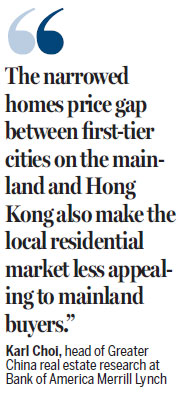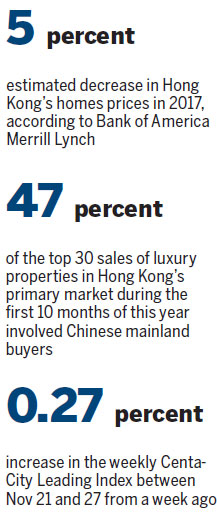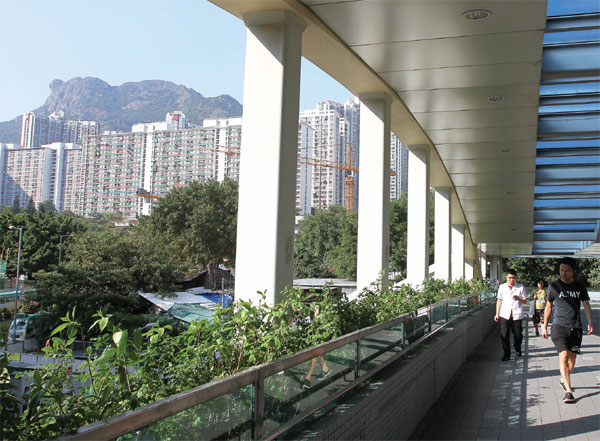Rate-hike fears set to dent Hong Kong property sector
Updated: 2016-12-13 07:35
By Lin Wenjie in Hong Kong(HK Edition)
|
|||||||||
|
Properties in Wong Tai Sin, Kowloon - one of Hong Kong's most densely populated districts. Despite signs of the local property sector waning, local residents' inelastic demand for smaller apartments is believed to be the market's key supporting factor amid global uncertainties. Parker Zheng / China Daily |
Property prices in Hong Kong are expected to drop steadily in the coming years, hit by a proposed new stamp duty, as well as a possible US interest-rate hike soon, experts say.
However, analysts point out that solid residential demand from both Chinese mainland and Hong Kong residents will continue to prop up the local market.
Bank of America Merrill Lynch (BOAML) predicts that Hong Kong homes prices will fall by 5 percent next year. The city's secondary property prices are forecast to slump a cumulative 20 percent in the next three years, ending a 13-year upsurge from 2003 to 2016.
The Centa-City Leading Index, an indicator of secondary private residential property prices, rose to 144.47 during the week between Nov 21 and 27 - up 0.27 percent from a week earlier, but is slightly lower than the all-time peak of 146.92 recorded on Sept 13.
"Higher US interest rates and the depreciation of the renminbi, which has drained purchasing power from the mainland, have contributed to the fall in property prices," said Karl Choi, head of Greater China real estate research at BOAML.

"The narrowed homes price gap between first-tier cities on the mainland and Hong Kong also make the local residential market less appealing to mainland buyers," he said.
The US bank anticipates that the US Federal Reserve will start a faster hiking cycle in 2018 after raising interest rates this month, with one more increase next year. The decision would mean higher mortgage costs in Hong Kong as the Hong Kong dollar is pegged to the greenback.
The International Monetary Fund (IMF) also believes that a steeper-than-expected US rate cycle or tightening of global financial conditions may have a bigger adverse impact against a backdrop of high household debt with floating rate mortgages.
"With stretched valuations, there is the risk of an accelerated price adjustment should interest rates rise faster than expected," the latest IMF report said. "Although the financial system would be resilient to such an adjustment, there is a risk to the real economy from an adverse spiral of negative wealth effects, lower collateral values, slower credit growth and weaker household and corporate spending."
Global property consultancy Knight Frank also said in its Dec 1 report that abundant supply, the start of a US rate-increase cycle, the mainland's economic slowdown and local policy uncertainties may drag down mass residential prices by 5 percent next year. However, prices for small-sized apartments and super-luxury houses will surge 5 percent due to strong demand.
Knight Frank senior director Thomas Lam said the market should brace itself for an aggressive interest-rate hike instead of a moderate one. "For example, a 50-basis point increase in the mortgage rate will only lift the monthly mortgage payment by HK$1,000 for every HK$4 million borrowed," he said.
Lam said the 15-percent rise in the stamp duty rate is expected to suppress investment demand and trim the transaction volume of residential sales, which is very "unhealthy" for the development of the secondary property market. But, due to strong end-user demand and a robust primary market, there will not be a property market crash, he reckoned.

The strong backing power for the secondary market partly comes from the mainland, especially for super-luxury homes, because of the scarcity of stock and Hong Kong's attractiveness for the super-rich, according to Knight Frank.
Statistics from Knight Frank show that among the primary luxury sales worth over HK$30 million executed during the first 10 months of this year, 27 percent involved mainland buyers. This increased to 47 percent if only the top 30 deals during the period are calculated.
BOAML forecasts additional housing demand from 2018 to 2022, of between 3,000 and 4,000 units, due to an estimated 18,232 mainland immigrants who will be eligible for Hong Kong permanent residency through the Capital Investment Entrant Scheme. This could mean a one-time boost for the market with new supply of an estimated 18,000 to 20,000 units.
Meanwhile, in the primary market, mainland developers have been increasingly active in residential land acquisitions in Hong Kong, in an attempt to hedge against the depreciation of the renminbi. So far this year, more than 30 percent of residential land has been snapped up by mainland developers in terms of developable gross floor area. Besides the mainland's backing power, solid demand from Hong Kong residents will push up prices of smaller apartments.
"As for affordability, more and more mini- to small-sized apartments will be launched in the next few years and prices will continue to rise," according to Knight Frank.
Knight Frank forecast a 5 to 10-percent growth in residential property prices next year.
Its research shows that small units will likely remain the market focus, with 36 percent of new apartments to be provided between 2017 and 2019 being of less than 430 square feet in area, compared to 30 percent in 2015.
cherrylin@chinadailyhk.com
(HK Edition 12/13/2016 page9)
